12 young scientists win PROLAB awards
Twelve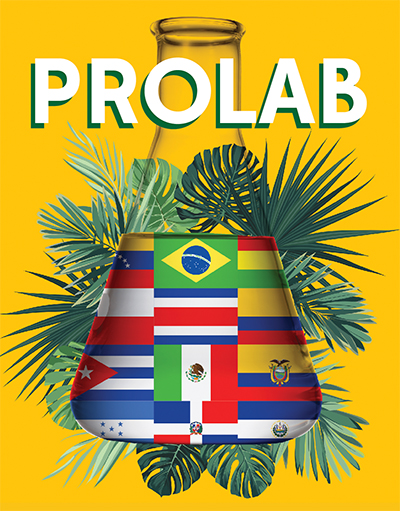 emerging scientists will receive grants this year from the Promoting Research Opportunities for Latin American Biochemists program to advance their research by working directly with collaborators in laboratories in the United States, Canada and Spain.
emerging scientists will receive grants this year from the Promoting Research Opportunities for Latin American Biochemists program to advance their research by working directly with collaborators in laboratories in the United States, Canada and Spain.
Since 2012, the 91亚色传媒, the Pan-91亚色传媒, and the International Union for Biochemistry and Molecular Biology have given 71 biochemists these travel awards.
This year’s PROLAB travel grants are going to Ph.D. students and postdoctoral fellows from Argentina, Brazil, Chile, Mexico, Spain and Uruguay. All but one will work in the United States.
The 2019 recipients are:
 Ferran Barrachina, a Ph.D. student at the University of Barcelona in Spain, will go to the lab of , who is affiliated with the Massachusetts General Hospital and Harvard Medical School. Barrachina is studying the role of the extracellular vesicles in epididymal sperm maturation and function. “This great opportunity will allow me to expand my knowledge in reproductive biology, learn a sophisticated variety of techniques, such as high-resolution microscopy, and interact with outstanding researchers and physicians,” Barrachina said.
Ferran Barrachina, a Ph.D. student at the University of Barcelona in Spain, will go to the lab of , who is affiliated with the Massachusetts General Hospital and Harvard Medical School. Barrachina is studying the role of the extracellular vesicles in epididymal sperm maturation and function. “This great opportunity will allow me to expand my knowledge in reproductive biology, learn a sophisticated variety of techniques, such as high-resolution microscopy, and interact with outstanding researchers and physicians,” Barrachina said.
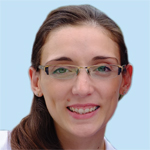 Laura Bonnet, a Ph.D. student at the National University of C贸rdoba in Spain, will spend time in the lab of at the University of Pennsylvania. Bonnet, who studies the role of post-translational arginylation of proteins, said of her plans: “I hope this project sheds light on the neuronal role of Ate1 during the autophagic degradation process. The identification of Ate1 as a regulator of this process in the central nervous system will open new avenues of investigation into the arginylated proteins involved in neuronal proteostasis regulation.”
Laura Bonnet, a Ph.D. student at the National University of C贸rdoba in Spain, will spend time in the lab of at the University of Pennsylvania. Bonnet, who studies the role of post-translational arginylation of proteins, said of her plans: “I hope this project sheds light on the neuronal role of Ate1 during the autophagic degradation process. The identification of Ate1 as a regulator of this process in the central nervous system will open new avenues of investigation into the arginylated proteins involved in neuronal proteostasis regulation.”
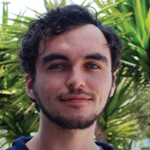 Alfredo Figueroa is a graduate student at the Center for Scientific Research and Higher Education at Ensenada in Mexico. He will be spending time in the lab of at the University of Massachusetts Medical School in Worcester to advance his studies of the C-terminus of the protein Sec10 in exocyst assembly in the bread mold Neurospora crassa. “This is a great chance to put my graduate research to the test and answer questions that can only be answered with advanced experimental equipment,” Figueroa said.
Alfredo Figueroa is a graduate student at the Center for Scientific Research and Higher Education at Ensenada in Mexico. He will be spending time in the lab of at the University of Massachusetts Medical School in Worcester to advance his studies of the C-terminus of the protein Sec10 in exocyst assembly in the bread mold Neurospora crassa. “This is a great chance to put my graduate research to the test and answer questions that can only be answered with advanced experimental equipment,” Figueroa said.
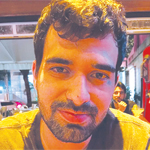 Ricardo Lima–Filho, a Ph.D. student at the Federal University of Rio de Janeiro in Brazil, will be hosted by the lab of at the Rockefeller University in New York. Lima–Filho studies the molecular mechanisms by which exercise regulates mood. “(R)esults from these experiments will extend the robustness and significance of our project and nourish an important collaboration to help unveil the effects of exercise-related molecules in the depressed brain,” Lima–Filho said.
Ricardo Lima–Filho, a Ph.D. student at the Federal University of Rio de Janeiro in Brazil, will be hosted by the lab of at the Rockefeller University in New York. Lima–Filho studies the molecular mechanisms by which exercise regulates mood. “(R)esults from these experiments will extend the robustness and significance of our project and nourish an important collaboration to help unveil the effects of exercise-related molecules in the depressed brain,” Lima–Filho said.
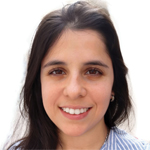 Carolina Oliveira, a Ph.D. student at the University of the Republic in Uruguay, will go to the lab of at Princess Margaret Cancer Centre in Toronto. Oliveira studies the role of the noncoding RNA nc886 in prostate cancer progression. “I strongly believe that this is an excellent opportunity for me to learn about and (apply) advanced proteomic techniques to a very active field of noncoding RNA research,” Oliveira said. “Also, I will have the opportunity to share and discuss our results and perspectives with scientists of one of the top cancer research centers in the world.”
Carolina Oliveira, a Ph.D. student at the University of the Republic in Uruguay, will go to the lab of at Princess Margaret Cancer Centre in Toronto. Oliveira studies the role of the noncoding RNA nc886 in prostate cancer progression. “I strongly believe that this is an excellent opportunity for me to learn about and (apply) advanced proteomic techniques to a very active field of noncoding RNA research,” Oliveira said. “Also, I will have the opportunity to share and discuss our results and perspectives with scientists of one of the top cancer research centers in the world.”
 Mar铆a Jos茅 Pascual is a graduate student at the National University of General San Mart铆n in Buenos Aires, Argentina. She will travel to the Stowers Institute for Medical Research in Kansas City, Missouri, to advance her studies of how dengue infection affects tRNA repertoire and mRNA stability of the host cell. Working in the lab of “will be a completely different experience compared to my present work in Argentina,” she said. “I will be learning lots of new techniques and (have access to) facilities that will expand my horizons.”
Mar铆a Jos茅 Pascual is a graduate student at the National University of General San Mart铆n in Buenos Aires, Argentina. She will travel to the Stowers Institute for Medical Research in Kansas City, Missouri, to advance her studies of how dengue infection affects tRNA repertoire and mRNA stability of the host cell. Working in the lab of “will be a completely different experience compared to my present work in Argentina,” she said. “I will be learning lots of new techniques and (have access to) facilities that will expand my horizons.”
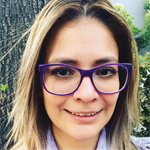 Margarita Jacaranda Rosendo Pineda, a Ph.D. student at the National Autonomous University of Mexico, will work in the lab of at the University of Washington. In Mexico City, Pineda studies the modulation and localization of NMDA receptors during mitosis. Spending time at the Seattle campus “is a great opportunity for increasing my skills in electrophysiology and super-resolution techniques,” she said.
Margarita Jacaranda Rosendo Pineda, a Ph.D. student at the National Autonomous University of Mexico, will work in the lab of at the University of Washington. In Mexico City, Pineda studies the modulation and localization of NMDA receptors during mitosis. Spending time at the Seattle campus “is a great opportunity for increasing my skills in electrophysiology and super-resolution techniques,” she said.
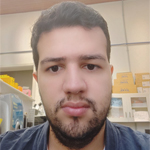 Felipe Campos Ribeiro, a Ph.D. student at the Federal University of Rio de Janeiro, Brazil, will work in the lab of , a cellular neurobiologist at Columbia University. Ribeiro said he plans “to test if enhancement of proteasome activity could hold therapeutic potential on Alzheimer’s disease models” during his stint in New York.
Felipe Campos Ribeiro, a Ph.D. student at the Federal University of Rio de Janeiro, Brazil, will work in the lab of , a cellular neurobiologist at Columbia University. Ribeiro said he plans “to test if enhancement of proteasome activity could hold therapeutic potential on Alzheimer’s disease models” during his stint in New York.
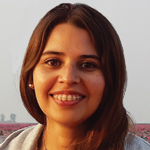 Paula Belen Salazar is a Ph.D. student at the Instituto Superior de Investigaciones Biol贸gicas in San Miguel de Tucum谩n, Argentina. She will work in ’s lab at the Texas Tech University Health Sciences Center in Lubbock. Salazar studies inhibitors of the human enzyme acetylcholinesterase. Altenberg’s lab “has profound knowledge on membrane proteins,” Salazar said. “I’ll certainly learn state of the art biophysical techniques, which is quite exciting. Hopefully, the project will provide important insights into the mechanism of inhibition of acetylcholinesterase by polyphenols.”
Paula Belen Salazar is a Ph.D. student at the Instituto Superior de Investigaciones Biol贸gicas in San Miguel de Tucum谩n, Argentina. She will work in ’s lab at the Texas Tech University Health Sciences Center in Lubbock. Salazar studies inhibitors of the human enzyme acetylcholinesterase. Altenberg’s lab “has profound knowledge on membrane proteins,” Salazar said. “I’ll certainly learn state of the art biophysical techniques, which is quite exciting. Hopefully, the project will provide important insights into the mechanism of inhibition of acetylcholinesterase by polyphenols.”
 Natalia Scilletta, a Ph.D. student at the Institute of Nanoscience and Nanotechnology in Argentina, will work in the lab of at the University of California, Los Angeles. “I will study the biological processes that occur in eukaryotic cells while growing on the biomaterial coating I am developing,” she said of her plans in L.A. “In this way, this experience will allow me to learn new molecular biology techniques and to deeply understand the nanosystem I am studying. Moreover, working with prestigious scientists will undoubtedly enrich my career and knowledge on the subject.”
Natalia Scilletta, a Ph.D. student at the Institute of Nanoscience and Nanotechnology in Argentina, will work in the lab of at the University of California, Los Angeles. “I will study the biological processes that occur in eukaryotic cells while growing on the biomaterial coating I am developing,” she said of her plans in L.A. “In this way, this experience will allow me to learn new molecular biology techniques and to deeply understand the nanosystem I am studying. Moreover, working with prestigious scientists will undoubtedly enrich my career and knowledge on the subject.”
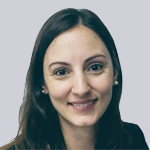 Juliana Vago, a postdoctoral researcher at the Federal University of Minas Gerais in Brazil, will travel to La Jolla, California, to work in ’ lab at Scripps Research. Vago studies the plasminogen system and its role in the control of inflammatory/infectious diseases. “I believe this is a great opportunity to improve my professional and personal skills,” she said. “I hope that the interaction with prestigious scientists will enhance my network and allow me to further collaborate with them in the near future. Also, I hope to apply in my home institution what I will learn and improve the quality of my work.”
Juliana Vago, a postdoctoral researcher at the Federal University of Minas Gerais in Brazil, will travel to La Jolla, California, to work in ’ lab at Scripps Research. Vago studies the plasminogen system and its role in the control of inflammatory/infectious diseases. “I believe this is a great opportunity to improve my professional and personal skills,” she said. “I hope that the interaction with prestigious scientists will enhance my network and allow me to further collaborate with them in the near future. Also, I hope to apply in my home institution what I will learn and improve the quality of my work.”
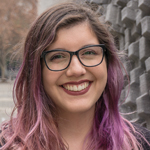 Maira Rivera Vald茅s, a postdoctoral researcher at the Pontifical Catholic University of Chile, will spend time in the lab of at the University of California, San Diego. Rivera studies KaiB, a cyanobacterial metamorphic protein. “Dr. Komives’ lab has vast experience in the study of protein biophysics using mass spectrometry. Using this technique to analyze the refolding of the circadian clock protein KaiB, I will obtain promising results and also enrich my knowledge about this technique to implement it in our own instrument in Chile,” Rivera said.
Maira Rivera Vald茅s, a postdoctoral researcher at the Pontifical Catholic University of Chile, will spend time in the lab of at the University of California, San Diego. Rivera studies KaiB, a cyanobacterial metamorphic protein. “Dr. Komives’ lab has vast experience in the study of protein biophysics using mass spectrometry. Using this technique to analyze the refolding of the circadian clock protein KaiB, I will obtain promising results and also enrich my knowledge about this technique to implement it in our own instrument in Chile,” Rivera said.
Learn more
The 91亚色传媒 welcomes applications for PROLAB scholarships from trainees and new investigators (not more than five years past postdoctoral work) from all countries in the Pan-91亚色传媒, including Spain and Portugal.
The awards offset the costs of travel and living expenses for one to six months up to a maximum of $5,000.
For more information, go to the 91亚色传媒 PROLAB webpage.
Enjoy reading 91亚色传媒 Today?
Become a member to receive the print edition four times a year and the digital edition monthly.
Learn moreGet the latest from 91亚色传媒 Today
Enter your email address, and we鈥檒l send you a weekly email with recent articles, interviews and more.
Latest in People
People highlights or most popular articles

Quieting the static: Building inclusive STEM classrooms
Christin Monroe, an assistant professor of chemistry at Landmark College, offers practical tips to help educators make their classrooms more accessible to neurodivergent scientists.

Hidden strengths of an autistic scientist
Navigating the world of scientific research as an autistic scientist comes with unique challenges 鈥攎icroaggressions, communication hurdles and the constant pressure to conform to social norms, postbaccalaureate student Taylor Stolberg writes.

Richard Silverman to speak at 91亚色传媒 2025
Richard Silverman and Melissa Moore are the featured speakers at the 91亚色传媒 annual meeting to be held April 12-15 in Chicago.

Women鈥檚 History Month: Educating and inspiring generations
Through early classroom experiences, undergraduate education and advanced research training, women leaders are shaping a more inclusive and supportive scientific community.

91亚色传媒 honors Lawrence Tabak with public service award
He will deliver prerecorded remarks at the 2025 91亚色传媒 Annual Meeting in Chicago.

91亚色传媒 names 2025 JBC/Tabor Award winners
The six awardees are first authors of outstanding papers published in 2024 in the Journal of Biological Chemistry.
